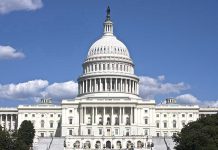
When a presidential pardon collides with fresh criminal charges against a former Capitol rioter, the nation faces a hard reckoning over the price of political mercy and the threat it poses to democracy’s defenders.
Story Highlights
- A pardoned January 6 rioter is now charged with threatening to assassinate House Minority Leader Hakeem Jeffries.
- The case spotlights the dangers and fallout of blanket pardons for politically motivated offenders.
- Law enforcement action was triggered by an FBI tip citing explicit threats and mental health concerns.
- The incident reignites intense debate over executive clemency, public safety, and political violence.
Pardoned Rioter Faces New Charges: A Test of Clemency’s Limits
Christopher Moynihan, once a footnote in the history of the January 6 Capitol riot, is now at the center of a national controversy that refuses to fade. Moynihan, pardoned by President Trump in early 2025, stands accused of threatening to assassinate House Minority Leader Hakeem Jeffries. The FBI received an anonymous tip on October 17 detailing Moynihan’s alleged intent and erratic behavior, prompting swift law enforcement action. This case forces a fresh look at the consequences of presidential pardons for those convicted of political violence.
Critics of Trump’s blanket pardons warned that unchecked clemency could embolden offenders to repeat or escalate their actions. Moynihan’s arrest on October 19, followed by his not guilty plea at arraignment, gives substance to those fears. The timing is striking: less than a year after his release, Moynihan allegedly made explicit threats against a high-profile political adversary. Law enforcement and political leaders now face a complex problem—how to balance forgiveness with the need to protect democratic institutions from ongoing threats.
Political Fallout and the Struggle for Accountability
Jeffries’ response has been direct and defiant. “Threats of violence will not stop us from showing up, standing up and speaking up for the American people,” he declared, refusing to let intimidation shape his public service. The controversy has reignited debate on the wisdom and risks of mass pardons for politically motivated crimes. Trump’s use of executive clemency was intended to reward loyalty and signal solidarity with his base, but the aftermath raises uncomfortable questions about accountability and deterrence.
Law enforcement agencies, tasked with protecting lawmakers and investigating credible threats, now operate under heightened scrutiny. The FBI and New York State Police acted quickly, but critics wonder if the system can adequately monitor and respond to recidivism among pardoned individuals. Congressional leaders, especially those targeted by threats, face increased security concerns and a climate of unease. The ripple effects extend beyond Capitol Hill, shaping public trust in the justice system and the perceived legitimacy of executive power.
Risks of Recidivism and Evolving Security Measures
The Moynihan case is not an isolated incident. Since the Capitol riot, threats against lawmakers have surged, and recidivism among pardoned offenders has become a real concern. Legal scholars argue that blanket pardons for politically motivated crimes undermine deterrence and set a dangerous precedent. Security experts advocate for robust monitoring and community reporting to prevent future attacks. The incident exposes a significant gap in how recidivism is managed, especially for individuals with histories of extremist ideology and substance abuse.
The case also underscores the tension between executive clemency and legislative security. Trump’s authority to pardon is constitutionally protected, but when the consequences include renewed threats to lawmakers, calls for reform grow louder. Political scientists warn that normalizing political violence through leniency sends troubling signals to future offenders. Law enforcement professionals stress that interagency cooperation and vigilant community reporting are vital tools in mitigating risk. The episode serves as a stark warning: forgiveness without oversight may invite fresh danger.
Broader Implications: Democracy Under Pressure
Short-term effects are already visible. Lawmakers face heightened security, and the debate over presidential pardons has intensified. Public officials worry about the chilling effect of threats on political participation, and communities question the integrity of the justice system. The long-term stakes are even higher. Legislators may seek changes to limit or review executive pardon powers, and the legal sector anticipates increased demand for threat assessment and monitoring. The political sector, meanwhile, faces renewed calls for accountability and reform.
Deep divides over the meaning and use of clemency remain. Supporters argue pardons correct injustices and restore balance for political allies. Critics contend that mass pardons for political crimes undermine the rule of law and threaten public safety. Major news outlets and official law enforcement statements consistently detail the facts and significance of Moynihan’s case. The evidence is clear: unchecked pardons for political violence carry risks that reverberate far beyond the courtroom, challenging the very foundations of democratic governance.


















